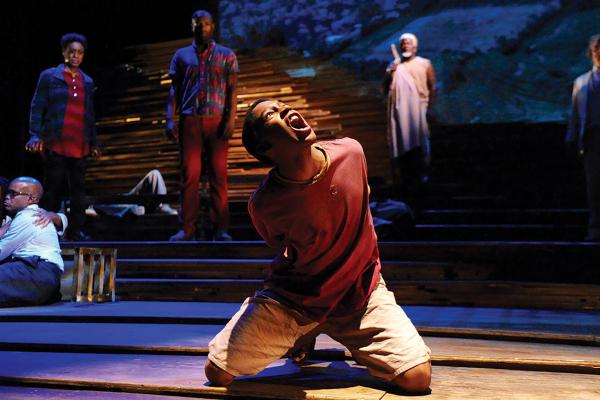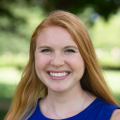IN ITS MOST BASIC FORM, theater is about transformation: altering voices, mannerisms, appearances, and scenery until what was becomes unrecognizable. Theater is also about resurrection: an empty stage brought to life, an untold story come alive. And no theater better embodies resurrection than Mosaic Theater.
In fall 2014, the Edlavitch Jewish Community Center (JCC) of Washington, D.C., forced its theater company, Theater J, to cancel the critically acclaimed Voices of the Changing Middle East Festival due to pressure from JCC donors upset with the festival’s controversial nature. Ari Roth, Theater J’s artistic director, protested the end of the festival’s groundbreaking interfaith dialogue and was subsequently fired. Afterward, he established Mosaic Theater, of which he is the founding artistic director.
“In a way, it was a very dramatic, abrupt, and even violent birth,” Roth told Sojourners. “It involved collateral damage, harsh words, a firing, accusations of censorship, a divorce. There was a rupture.”
Mosaic Theater was born from broken relationship—yet today it stands as a testament to inclusion, reconciliation, and renewal. Located on H Street in D.C.’s Northeast quadrant, Mosaic is a thriving fusion community committed to producing high-quality, socially relevant art in an uncensored environment. It is now in the middle of its fourth season, titled “How Hope Happens.”
“Moving to Mosaic meant we would lose Judaism but keep the prophetic piece. It would be multifaith, a mosaic of faiths united by common values. And the top value was a belief in the power of art to transform and transport people and communities to new places,” said Roth.
Artistic agitators
The Mosaic community embraces friction. The second of eight plays featured this season, “The Agitators,” showcases the enduring, abrasive, 45-year relationship between Susan B. Anthony and Frederick Douglass. The two rarely see eye to eye. Interests conflict and tempers flare as Anthony and Douglass strive to secure voting rights for women and African Americans, respectively. During the play’s climax, Anthony, played by Marni Penning, asks, “How can we learn to stay in the room with people we hate and who hate us?”
Performed during the 2018 midterm elections, this production boldly considers a model of authentic allyship in an age of oppression and political turmoil.
The theater’s Voices from a Changing Middle East Festival, which is now in its 18th year after being carried over from Theater J by Roth, also stages conflict and complex alliances. The festival traditionally produces plays focusing on the relationship between Israelis and Palestinians. But as Victoria Baatin, associate artistic director for Mosaic, remarked, “The festival is a space to put voices from different sides of any given spectrum in dynamic tension.”
Roth added that staging difficult encounters is part of the theater’s values. “We want to put onstage fraught partnerships and examine them, to try to create functionality from disfunction—especially as they traverse ideological or political, religious, or racial lines.”
Leveraging levity
The Mosaic community welcomes discord and grapples with injustice, yet still provides ample room for laughter.
“Although we’re often dealing with heavy topics ... it became a priority for us to find the humor and to find opportunities to uplift as we’re shining a light and amplifying voices and stories,” said Baatin. Mosaic’s 2018-19 season does just that. The season’s third show, “Oh, God” is the first comedy piece in the Voices Festival. Considered Mosaic’s “holiday show,” the play’s director, Michael Bloom, characterized the production as “a feminist commentary that deals with the patriarchal, traditional God we know from the Old Testament.”
The play cheekily considers what happens when Ella, a secular psychotherapist, receives a new, high-profile patient: God. Over the span of one session, God grapples with his feelings of isolation, boasts of his last-minute addition to creation (a kangaroo: “I thought, why not put in a pocket for the baby?”), and attempts to fix a finicky DVD player. Interspersed with sometimes hilarious, sometimes hard-hitting observations by Ella (“Only God could be so inhuman”), this offering showcases Mosaic’s ability to strike the perfect balance of humor and intensity.
A community theater
A core component of Mosaic’s identity is its commitment to be a theater by and for the community. Mosaic offers neighborhood discounts to those in the Northeast and Southeast quadrants of D.C., and most of the theater’s subscribers come from within its own zip code. The result is that Mosaic serves a racially and ethnically diverse neighborhood that’s in the middle of change.
Mosaic also fosters community by partnering with local writers and producing their plays. The theater’s initiative to commission pieces from local writers allows playwrights at Mosaic—including Roth, who continues to write pieces even as founding director—to nurture local talent.
“Building a major work from a local place of origin is not only tremendously exciting, but it’s also efficient,” said Roth. “And there’s such a wealth of talent here, in terms of the issues of race and identity that Mosaic is working on.”
Authentic diversity
At Mosaic, diversity isn’t an afterthought: It’s part of the DNA. “It’s trendy to be diverse and it’s trendy to be inclusive,” said Baatin. “But Mosaic is not doing it as an additive. It is built into our vision and core values as a company. So we talk about not just diversity, but also inclusion, equity, and access. It’s not diversity for diversity’s sake.”
Since its first season, Mosaic has exhibited its commitment to inclusion by featuring performances on topics such as a Muslim transgender person transitioning, Filipino migrants performing as drag queens, and a young black woman facing unexpected pregnancy. The Mosaic adaption of “Oh, God” includes an autistic character—the psychotherapist’s teenage son, Lior, played by Sean McCoy. The production utilizes an autism coach to ensure appropriate representation of autistic behavior.
Mosaic is also remarkably accessible. For example, Mosaic incorporated surtitles into the scenography of “The Agitators” for those who are deaf or hard of hearing. For other plays, Mosaic offers assisted listening devices and can provide large print programs or script copies if requested a week prior to a performance.
Fully alive
Though Mosaic was birthed from the ruins of controversy, its bold, vibrant productions exemplify beauty resurrected from brokenness. And threads of resurrection are woven throughout Mosaic’s efforts to engage in the prophetic impulse to reckon and reconcile.
This season, “The Agitators” reveals the beauty of sacrificial love when it asks viewers to fight for one another as much as they fight for themselves. “Shame 2.0,” which is being reimagined and partially rewritten by Roth, deals with the unexpected partnership of Israeli and Palestinian artists amid an elaborate censorship controversy. “Oh, God” also shows the power of redeemed relationships when a psychotherapist rediscovers faith in God—and God rediscovers love for humanity.
“The greatest command we have is to love. And not just to love, but to spur one another to love,” said Baatin. “And I think that theater ... helps us to recognize the humanity in the other person that’s right next to us. It’s through recognizing that humanity that we can increase our empathy. And then, through that increase in empathy, maybe begin to creep toward that expression of love.”
By embracing the tension between despair and levity, brokenness and reconciliation, hate and love—and by doing so from the vantage point of an authentically diverse community—Mosaic explores the full breadth and depth of what it means to be alive.
“What we hope to do,” said Roth, “is to enter some tough chasms and divides that separate people, explore some of the darkest corners of the human condition, and, within our common humanity, create roads of redemption.”

Got something to say about what you're reading? We value your feedback!







